Bakers from Peristeria suburb of western Athens, created the largest New Year’s cake, Vasilopitu: 78 meters long, 9 tons in weight and with 200 lucky coins!
In a unique event, the Guild of Bakers of Athens, Suburbs and Surroundings (SAAPP) and the Municipality Peristeri created the biggest Vasilopitu in Greece, which broke all previous records. On December 29, at dawn, it was installed on Town Hall Square next to the metro station, to the delight of thousands of local residents and guests who came from all over Attica for the holiday.

The New Year’s cake was cut into more than 65,000 pieces and contained 200 lucky coins, corresponding to New Year’s gifts, as tradition dictates.
The pie was made by dozens of regional bakeries with the assistance of students from the School of Pastry Bakers of Galati. Ingredients used to create the giant cake: 5500 kg flour, 1700 kg sunflower oil, 500 kg sugar, 520 kg powdered sugar, 5000 eggs, 30 kg orange peel, 75 liters cognac, 70 kg ground cinnamon.
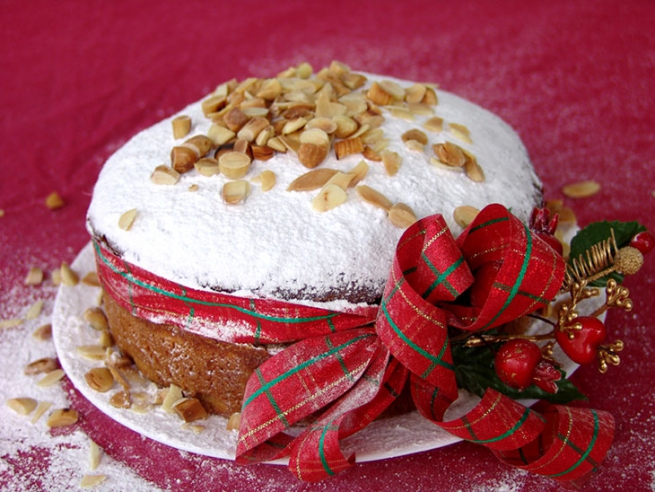
Your name Vasilopita received on behalf of the Greek Father Frost, whose name is not Santa Claus, but Agios Vasilis (Ai-Vasilis), that is, Saint Basil. Name day is celebrated on January 1st Basil And Vasiliki. As soon as the clock strikes twelve, the lights go out and a minute later they come back on, everyone congratulates each other, saying “χρόνια πολλά”, which means long years, and και “ευτυχισμένο το νέο έτος”, happy New Year. The New Year is greeted with applause, glasses of wine are clinked, and then the climax comes – the Greek New Year’s cake is cut “Vasilopita”
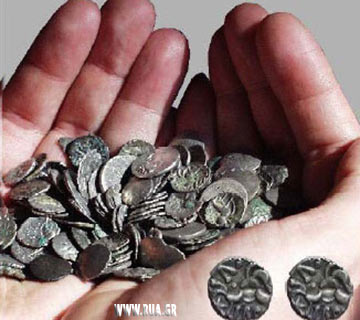
At the same time, everyone sitting at the table wishes that they would get a lucky flury coin. The lucky one who finds it in his piece of the pie, according to legend, will be accompanied by good luck and success. The coin is usually placed in a wallet so that it never runs out of money. Interestingly, the absence of any family member when cutting the vasilopita does not deprive him of his chance of success. A piece of it is frozen and stored until the meeting.
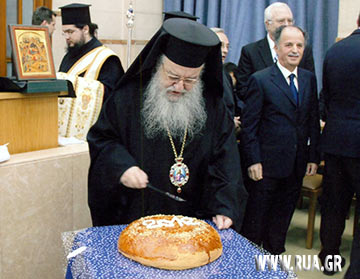
Vasilopitu traditionally cut not only in every home, but also in every organization, institution or society. This does not necessarily happen on January 1, it can happen throughout the month, and sometimes noticeably later.
It is believed that tradition Vasilopita is rooted in the Greek-Roman past and appeared during the celebration of the day of Kronos by the Greeks, and the Saturnalia by the Romans. It was for these holidays that pies were baked, in which a coin was placed for good luck. With the establishment of Orthodoxy appeared Vasilopita, which, according to its name, is closely associated with the veneration of St. Basil the Great. Legend has it that Basil the Great, in order to protect Caesarea Cappadocia from advancing enemies, began collecting gold coins and other valuables from the city’s residents, with the goal of giving them to the enemy and thereby saving the city from destruction and robbery. Miraculously, the enemy retreated, and Basil the Great ordered to bake pies, in each of which they put a coin from the wealth that they had collected for the enemy and distribute it to the townspeople. In memory of the miraculous deliverance from robbery and the wisdom of the saint, the custom of baking Vasilopitu – a pie with a coin inside.
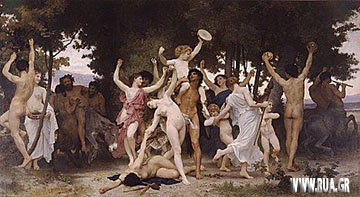
Recipe for Vasilopita:
Recipe Vasilopita: the manufacturing technique is demonstrated by TV presenter Elena Psihuli (just don’t be funny – this word is translated from Greek as “darling”) on a Greek television program, the name of which can be translated as “Chef on Air.”
Other Vasilopita recipes can be found at link.



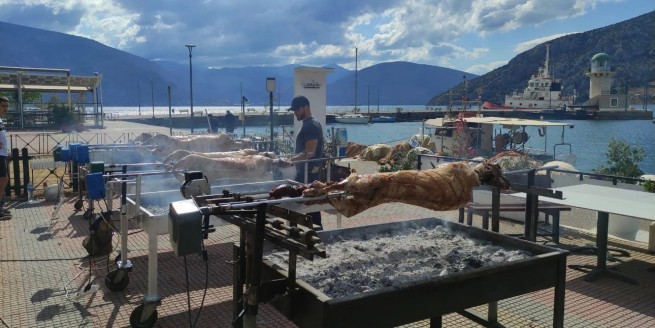



More Stories
Robot Sophia commented on her fall from the steps in Thessaloniki
Impressive "missile war" in Vrontado on Chios
Public transport traffic in Athens on Easter weekend